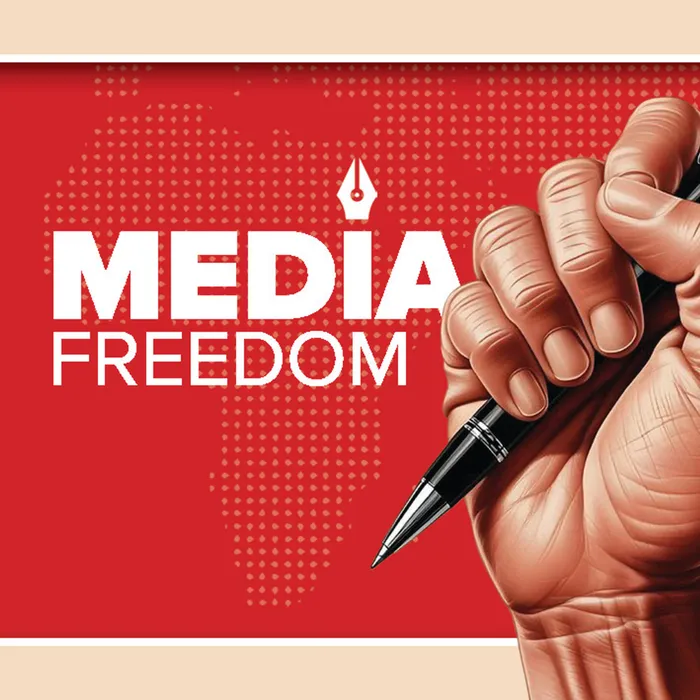Sanef and partners launch initiative to protect journalists and human rights defenders

Sanef, Lawyers for Human Rights (LHR) and Amnesty International SA launched a new initiative to protect journalists and human rights defenders.
Image: -
Human rights organisations and the South African National Editors’ Forum (Sanef) have launched a new initiative to protect journalists and human rights defenders from any form of threat and intimidation.
Sanef, Lawyers for Human Rights (LHR) and Amnesty International SA, launched ‘Create Project’ to safeguard journalists and human rights from rising threats in the form of online abuse, physical intimidation, surveillance and harassment.
The project, called Capacitating Resilience, Enhancing Accountability and Transforming the Environment (Create), aims to strengthen the protection of journalists and human rights defenders in Southern Africa.
The organisations said journalists and human rights defenders in South Africa and the region are facing rising threats in the form of online abuse, physical intimidation, surveillance and harassment in the face of a global anti-rights movement.
This comes as the organisations celebrated World Freedom Day on Saturday.
May 3 acts as a reminder to the governments of the need to respect their commitment to press freedom.
The organisations said the initiative recognised that attacks on media freedom and civic activism were not isolated and that they are part of a broader pattern aimed at silencing truth and undermining the democratic space.
The project is designed to push back against that.
In March 2018, former EFF deputy president, Floyd Shivambu, who is now the umKhonto weSizwe (MK) party secretary general, was caught on camera intimidating a multimedia journalist Adrian de Kock outside parliament.
In 2020, police in Swaziland raided the home of Zweli Martin Dlami, the editor of the Swaziland News, and arrested him for two articles he published about King Mswati III, lying about the political and economic situation and accusing him of promoting a cultural ceremony where women could be sexually abused. His laptops, cellphones, hard drives and other electronic devices were also seized.
In April 2021, SABC Radio news journalist Phanuel Shuma was forced to lay a charge of intimidation with police after brothers Manqoba and Lucky Khoza, who were accused of murder and a prosecutor accused of taking a bribe, wanted him to derail their case, at his workplace in Pretoria.
In 2022, human rights defenders Ayanda Ngila and Siyabonga Manqele were murdered and joined the growing list of activists who have been assassinated for their work, like environmental activist Mam’Fikile Ntshangase and whistleblower Babita Deokaran, who were killed for their role in advocating for the rights of marginalised communties and speaking out against corruption.
The new initiative aims to build a safe, supportive, and responsive environment where journalists can do their work without fear, and where defenders of human rights can continue to raise their voices without being punished for it.
Sanef executive director Reggy Moalusi said, “This is a key training initiative, coming at the right time when journalists across southern Africa are increasingly being harassed and intimidated. We seek to see a better environment where journalists are better treated and are allowed to do their work without any fear of being hunted down by those who simply hate the work they do, and they are afraid of being exposed for all the wrongdoing.”
At the core of the project is the development of a system where journalists can report threats and harassment safely and confidentially. These reports will not only help secure emergency support for those in immediate danger but will also contribute to a growing body of evidence that can be used to hold perpetrators accountable and influence legal and policy reforms.
Amnesty International SA executive director Shenilla Mohamed said, “This is an important project which underscores the work Amnesty International South Africa, along with other organisations, has been doing on human rights defenders. Journalists, like all human rights defenders, need to be protected. Attacks on journalists ultimately restrict the right to freedom of expression in the country and have the potential to limit the right of the public to access accurate information in the public interest. A vibrant and free press is a key building block of any society.”
By collecting and analysing data on threats and trends, the CREATE project will help shape more informed responses from policymakers, media organizations, and human rights institutions. The aim is to close the gaps that currently allow perpetrators of harassment and violence to act without consequence.
The organisations added that to protect press freedom, the broader environment must be safe for all defenders of rights and democracy. The project strengthens referral networks and access to information so that more defenders, not just those in major cities or established media, can get help when they need it most.
Furthermore, the initiative will contribute to policy and legal advocacy, including efforts to hold tech companies accountable for failing to prevent abuse and disinformation that endangers journalists and defenders. It also aims to support strategic litigation to create stronger legal protections for freedom of expression.
Meanwhile, the Government Communication and Information System (GCIS) said South Africa remains committed to upholding media freedom as guaranteed in Section 16 of the Constitution. "Our democracy has been enriched by a vibrant and diverse media landscape that plays a vital role in promoting transparency, advancing public discourse, and holding those in power to account. As the world marks this important day, Government also recognises the challenges faced by journalists globally, including censorship, harassment and violence. Government condemns all forms of intimidation and attacks against the media and calls for greater protection of journalists everywhere," said acting spokesperson Terry Vandayar.
manyane.manyane@inl.co.za
Related Topics:
